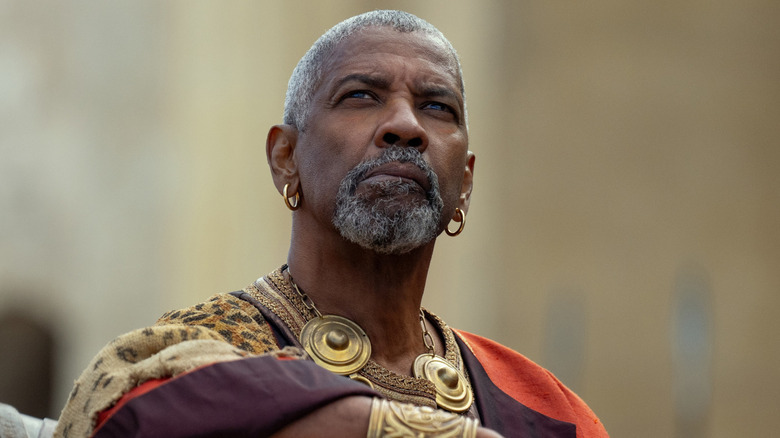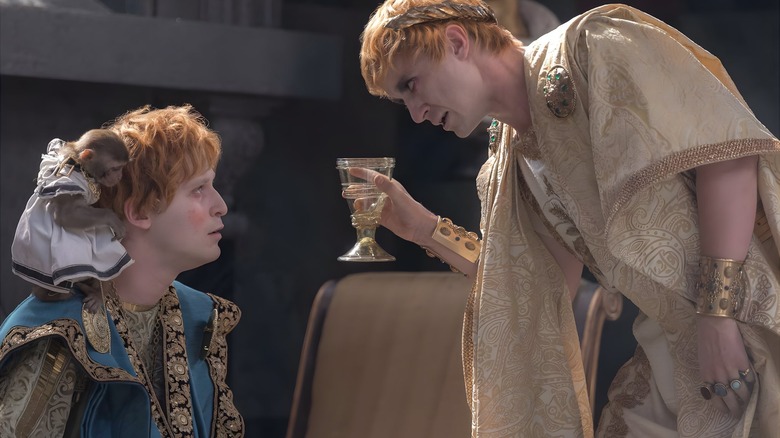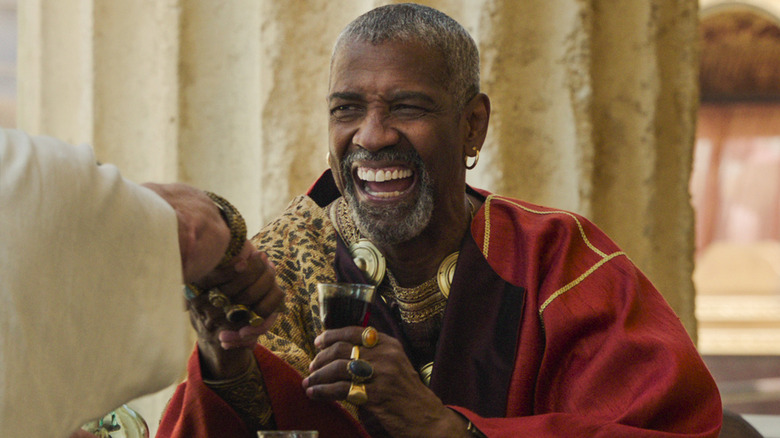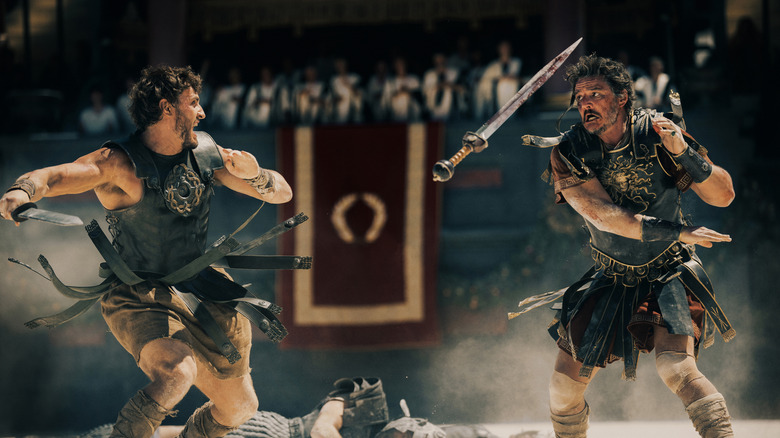How Much Of Gladiator 2 Is A True Story? More Than You Might Think
"Gladiator II" isn't just a legacy sequel to Ridley Scott's 2000 historical megahit "Gladiator" — it's also, as far as a lot of historians are concerned, the latest chapter in Scott's ruthless war on history itself. Academics barely had time to catch their breath from pointing out the historical inaccuracies in "Napoleon" before Scott hit them with a scene where Denzel Washington's scheming Roman businessman Macrinus sips coffee and reads a newspaper. These are impressive feats, considering the printing press wouldn't be invented for another 1200 years, and there's no evidence that Romans drank coffee.
Scott has been unapologetic about his casual regard for historical accuracy, responding to critics with scornful retorts like "get a life" and, "Were you there? Oh you weren't there. Then how do you know?" This rejection of doctrine was at the heart of Scott's 2021 historical drama "The Last Duel," which told the same story from three different perspectives to show how even basic details can change depending on the narrator.
Yet, despite the outright anachronisms, there are usually kernels of historical fact at the heart of Scott's historical fiction. For example, the real-life counterpart to Joaquin Phoenix's Commodus, the smirking villain of "Gladiator," was actually killed by a gladiator. His personal trainer, Narcissus, strangled Commodus in the bath after the emperor had already been poisoned by his concubine, Maria. "Gladiator II" takes a similar approach: plucking out a few tasty morsels of documented Roman history, and then adding a lot of embellishments.
Geta and Caracalla were real, and so was that fratricide
Joint emperors Geta (Joseph Quinn) and Caracalla (Fred Hechinger) rule Rome together in "Gladiator II," and are equally unpopular with the populace. Geta is the more level-headed of the two, while still being pretty unhinged, and he privately tries to protect Caracalla from the worst impulses of his syphilis-ravaged brain. Though they're pretty despicable, they're not the real villains of the movie, and it's actually pretty heartbreaking when Caracalla is manipulated by Macrinus into murdering his own brother.
Geta and Caracalla did technically rule Rome together (albeit briefly), but any brotherly love was wholly invented for "Gladiator II." The real brothers absolutely despised each other, and this loathing was only intensified when their father, Septimius Severus, misguidedly made them both his co-emperors and left them as his joint heirs upon his death. This shared reign lasted for less than a year, during which the two emperors wouldn't even be in the same room together without a contingent of bodyguards. They divided the imperial palace into two quietly warring territories, and were on the verge of dividing up the Roman Empire itself: Caracalla would get Europe and western Africa, while Geta would get Egypt and Asia.
In a last-ditch effort to make peace between them, their mother arranged a meeting between her sons. Caracalla used this meeting as a convenient opportunity to have Geta slaughtered by assassins, and became Rome's sole ruler.
Yes, Caracalla wasn't the giggly syphilitic monkey lover he's portrayed as in "Gladiator II." By all accounts, he was a cruel and bloodthirsty tyrant who did bad all by himself. There's no mention of Caracalla owning a beloved pet monkey, like his movie counterpart's dear Dondus, and he certainly didn't try to appoint a monkey to the Roman senate. He did, however, have around 20,000 people put to death for the vague crime of being "friends of Geta" — including Fadilla, the last surviving daughter of beloved emperor Marcus Aurelius (played by Richard Harris in "Gladiator"). This unrelenting reign of terror made Caracalla a serious contender for the title of Rome's most evil emperor.
Where "Gladiator II" returns to the history books again is Macrinus' role in Caracalla's death. In the film, Macrinus personally takes care of Caracalla's murder. The real Opellius Macrinus, like any good businessman, delegated it.
Denzel Washington's Macrinus is the most historically accurate character
Macrinus is one of Rome's wealthiest businessmen, who purchases Lucius (Paul Mescal) as a gladiator after being impressed by his baboon-biting skills. Since "Gladiator II" is largely a retread of the original film's plot, the audience is led to assume that Macrinus is an analog for Oliver Stone's Proximo: a slave turned freedman who becomes an ally for the protagonist. Macrinus certainly presents himself as such, even offering Lucius the head of his enemy in exchange for his service.
By the third act, however, Macrinus is revealed as the true villain of the movie, who has been plotting to become emperor himself. In a monologue to Lucilla (Connie Nielsen), Macrinus reveals that he was once a slave of her father, Marcus Aurelius, but has since risen to the role of a wealthy man, second consul, and ultimately claimed the highest seat of power in Rome — which, by extension, makes him the most powerful man in the world. Improbable as it might sound, this isn't far from the truth.
While certain corners of the internet groused about an African-American actor playing a Roman elite — let alone an emperor — there's a slight issue with their outrage: Macrinus actually was African. He wasn't even the first African Roman emperor (that would be Geta and Caracalla's father, Septimius Severus). The gold earrings that Washington wears in "Gladiator II" aren't just Hollywood embellishment, but were a traditional piercing for the Berber people of North Africa. A bust of the real Macrinus in Rome's Hall of the Emperors sports similar earrings. He was never a slave, but he was the first ever member of the equestrian class (roughly equivalent to knights in medieval Europe) to become emperor of Rome — and that was controversial at the time.
According to historian Edward Gibbon, Macrinus was a man of "crafty ambition" who used his business savvy to raised himself to a high position in Caracalla's court. After finding out that he'd somehow ended up on the emperor's hit list, Macrinus persuaded a soldier with a grudge against Caracalla to stab him in the back while he "had stopped on the road for some necessary caution" (that's historian for "pee break").
Macrinus is the final villain of "Gladiator II," but history remembers him more fondly, as the man who finally brought an end to Caracalla's reign of blood and terror. Gibbon wrote that, upon learning of the former emperor's death, the Roman senate initially "exulted in their unexpected deliverance from a hated tyrant." However, they were not happy about Macrinus being chosen as the new emperor by the army instead of the senate, especially since he was not himself a senator. He ruled for little more than a year before being assassinated and replaced with Geta and Caracalla's cousin, Elagabalus.
Lucius and Acacius are (mostly) fictional characters
When General Acacius' (Pedro Pascal) role in the plot to overthrow the emperors is revealed, an irate Geta tells him that his name will be erased from history. This was a Roman practice later dubbed by historians as damnatio memoriae — "damnation of memory" — in which a person's name would literally be erased from historical records and inscriptions, and their face would even be scrubbed from portraits.
There's an irony in Geta delivering this order, since Geta's own face was scrubbed from the Severan family portrait and other records after Caracalla had him killed. It's also a sly acknowledgment of the fact that history shows no record of a Roman general called Acacius. Probably the closest equivalent would be Gaius Marius, who defeated the Numidian king Jugurtha (played by Peter Mensah in "Gladiator II") and returned from Africa Nova in triumph, but Marius died around 300 years before Geta and Caracalla came into power.
Paul Mescal's Lucius Verus technically did exist, but "he existed" is about all the history books have to say about the son of Emperor Lucius Verus. Lucius' father, Lucilla's first husband, is much more well-documented. He was the adoptive brother of Marcus Aurelius and ruled alongside him as co-emperor for almost a decade before dying of illness. Lucius did have a son who was also called Lucius, along with two daughters, but all three died in childhood.
Since the real Macrinus was executed and succeeded to the throne by Elagabalus, "Gladiator II" can be seen as a kind of "what if...?" story. What if Lucius Verus II hadn't actually died as a child, but instead been kept hidden in exile and returned as a fully-grown badass? Certainly, as the son of one emperor and the grandson of another, Lucius would have had a strong claim to the throne. Perhaps he might have changed the course of history. Or, at very least, put some fear into the heart of baboons everywhere.
"Gladiator II" is in theaters now.



